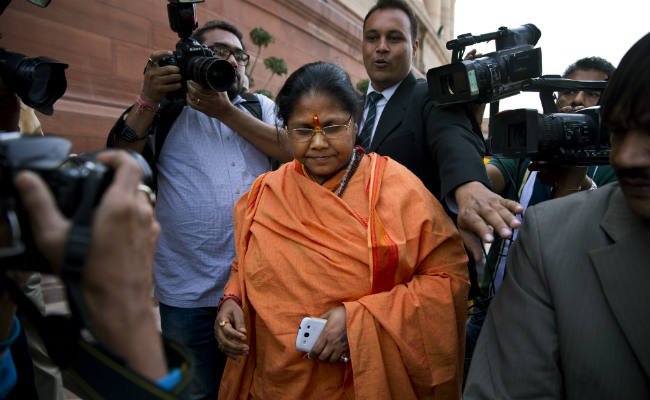
Both as individuals and a collective nation, it is important to shirk off the burdensome baggage of animosity and carry on the journey into future with a positive thinking and not get hamstrung with ugly words and actions. But one of the basic pre-requisites of forgiveness and moving on is a genuine and credible assurance that the acts that need to be forgotten would not be repeated
ANURADHA BHASIN JAMWAL
[dropcap]I[/dropcap]t was under duress that prime minister Narendra Modi made a statement in the parliament and his minister Sadhvi Niranjanjyoti apologized for her extremely abusive remark, after so vehemently justifying it for a day. When the prime minister makes a hesitant and sheepish intervention with a rebuke that the opposition only asked him to make a statement on the issue, he is not asking the nation to forgive and move on in life. What he’s doing is to ask everyone to forget, apology or no apology, and move on. Besides, he has also stirred another hornet’s nest in his appalling defence of the minister. His remarks that she should be forgiven as she comes from socially oppression section of society is a galling indictment of an entire class of people as ‘uncivilized’ and habitual of abusive discourse.
Of course, both as individuals and a collective nation, it is important to shirk off the burdensome baggage of animosity and carry on the journey into future with a positive thinking and not get hamstrung with ugly words and actions. But one of the basic pre-requisites of forgiveness and moving on is a genuine and credible assurance that the acts that need to be forgotten would not be repeated. How does one do that with the constant nagging fear that some vitriolic hate soaked speech by one or the other odd minister, many of them known for their obsessive penchant for xenophobic verbal terror, would soon begin to re-engage with similar words and actions.
Collective hurt does not demand a unilateral forgiveness, which requires a change in oneself, but a reconciliation, which requires a change in someone else. Reconciliation is possible only on basis of facts, acknowledgement, agreement and an understanding of the wrong and harm done and of each other’s point of view. It is building of trust through truth telling, remorse and apology. The goals of reconciliation are to prevent repetition of the harmful behavior and ensure healing and healthy co-existence. The root of this lies in truth telling and acknowledgement. But a culture low on repentance for what is socially, politically, morally and humanly wrong pushes in a discourse of ‘moving on’ built on the grave of this essential truth and acknowledgement.
The present controversy may be a very benign manifestation of this culture, though its shock value lies in the fact that it comes from the elected guardians of the highest temple of Indian democracy. But could one have expected any better? The head of this government and his man Friday were both accused of engineering and facilitating gross human rights crimes more than a decade ago in Gujarat; yet they are in power and popular even as they have till date showed no signs of remorse, much less ensure justice or provide a sense of security to the people who faced their xenophobic ire.

Would there be any genuine apology for Gujarat genocide, Babri mosque demolition, Kandhamal violence or the more recent Muzaffarnagar riots? Needless to point out that an apology is not sufficient for the nature of these crimes that inflict both physical and psychological injury on humans.
The culture of expecting forgiveness and a nation to move on, however, precedes this government. The Congress had its hands soaked in blood in 1984 riots and before that was its torturous trail in the period of Emergency. It has never shown any remorse, much less offer institutional justice but banked on the hope that people will reconcile as years pass by. 30 years on, it continues to evade answers on its handling of Bhopal gas tragedy. In states caught in militarized conflict, there is a long list of cases which have sent governments in denial and reprehensible ways in which truth is obfuscated.
Soni Sori sexual abuse and Manorama’s rape and murder are only some of the names that figure in these lists where both justice and apology is awaited but people are expected to reconcile to the fact and move on with their lives positively. Kashmir’s mounting cases of human rights abuse have shown the phenomenally deep psychological scar such incidents create. Everything becomes an inseparable bitter memory for a collective population, whether it is Kunanposhpora or Shopian, Gaw Kadal or 2010, Nadimarg or Chittisinghpora. Truth is awaited in thousands of cases and so is justice. These are crucial imperatives without which it is humanly impossible to move on.
Sadly, this culture of indifference and denial does not stem from any positive optimism about the need to ‘move on’. It stems from insensitivity, indifference and ‘sab chalta hai attitude’. Those pushing for need for justice in pursuit of egalitarian society and a democratic order are termed as responsible for retarding country’s progress. How does such an attitude define us as a nation? A nation of positive thinkers, who know how to move on despite all odds or a nation that has scant regard and respect for values of humanity or civilized order?
____________________
All opinions and views expressed in columns and blogs are those of individual writers and do not necessarily reflect the editorial policy of Caravan

